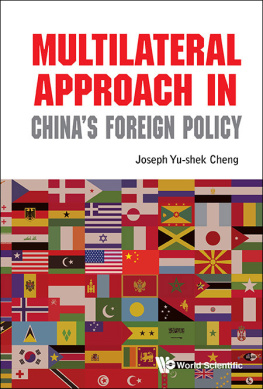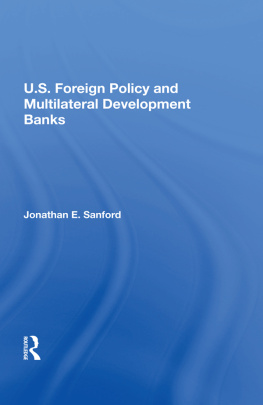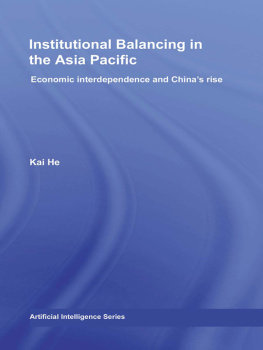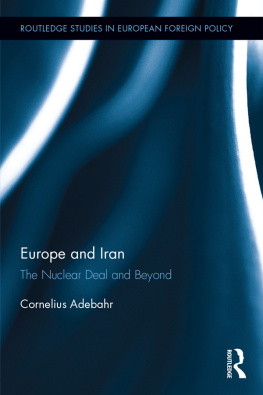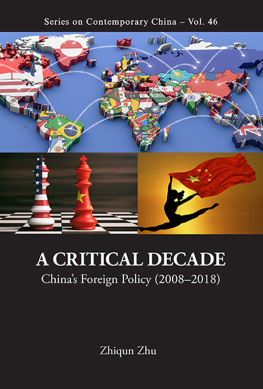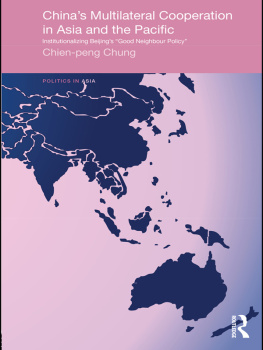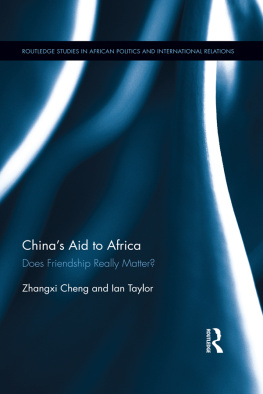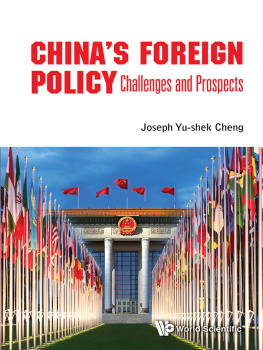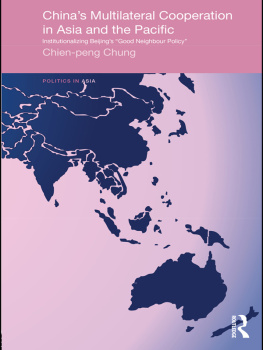

Published by
World Scientific Publishing Co. Pte. Ltd.
5 Toh Tuck Link, Singapore 596224
USA office: 27 Warren Street, Suite 401-402, Hackensack, NJ 07601
UK office: 57 Shelton Street, Covent Garden, London WC2H 9HE
Library of Congress Cataloging-in-Publication Data
Names: Zheng, Yushuo, 1949 author.
Title: Multilateral approach in Chinas foreign policy / by Joseph Yu-Shek Cheng.
Description: Hackensack, N.J. : World Scientific, 2017.
Identifiers: LCCN 2017023329 | ISBN 9789813221109 (hc : alk. paper)
Subjects: LCSH: China--Foreign relations--1976- |
International agencies--Government policy--China.
Classification: LCC JZ1734 .Z44 2017 | DDC 327.51--dc23
LC record available at https://lccn.loc.gov/2017023329
British Library Cataloguing-in-Publication Data
A catalogue record for this book is available from the British Library.
Copyright 2018 by World Scientific Publishing Co. Pte. Ltd.
All rights reserved. This book, or parts thereof, may not be reproduced in any form or by any means, electronic or mechanical, including photocopying, recording or any information storage and retrieval system now known or to be invented, without written permission from the publisher.
For photocopying of material in this volume, please pay a copying fee through the Copyright Clearance Center, Inc., 222 Rosewood Drive, Danvers, MA 01923, USA. In this case permission to photocopy is not required from the publisher.
Desk Editors: Chandrima Maitra/Lixi Dong
Typeset by Stallion Press
Email:
Printed in Singapore
This book is dedicated to my wife, Grace
Preface
As I am now in retirement from academic life, I decide to consolidate what I had written on multilateralism in Chinese foreign policy so as to present a comprehensive analysis on the topic. It involved substantial re-thinking, updating and re-writing and this book is the result. The book hopefully offers a useful, informative and stimulating background for a better understanding of multilateralism in Chinas foreign policy in the era of reforms and opening to the outside world.
China traditionally followed an orthodox bilateral approach in its conduct of foreign policy. It began to accept the multilateral approach with some hesitation through taking part in the ASEAN Regional Forum in 1994. Soon it took the initiative to organize the Shanghai Five group which formally became the Shanghai Cooperation Organization in 2001. The Shanghai Cooperation Organization was the first regional organization promoted by China, and its institutional-building represented the learning, experimentation and substantial efforts on the part of the Chinese leadership.
The ChinaAfrica Cooperation Forum approach then emerged in 2000. It represented an economical way of approaching the over-fifty countries in the African continent. The innovation worked and the model then spread to, among others, Latin America, the Gulf region, Central and Eastern Europe. At times, these mechanisms have not been very effective, but the experiments have proved their value.
In the Shanghai Cooperation and the BRICS group, while exploring Chinas superior financial strength, its leaders have been prudent to respect the interests of the other major powers involved. This prudence has been a significant factor for the survival and development of these two groups. In sum, the study of Chinas multilateral approach enables a student of foreign policy to go through its leaderships learning processes in the era of reforms and opening to the external world. Chinas efforts to establish and enhance international influence may be carefully examined; its limitations and frustrations are amply present.
As a researcher of Chinese foreign policy for 40 years and more, I value opportunities of ideas exchange with people sharing my academic interest. I believe writing and publishing is the principal way of participating in this enjoyable exchange; and this very thought gives me the motivation to produce this volume.
I would like to take this opportunity to thank all those who have assisted me in my academic career, and especially my wife Grace who has been helping me in so many ways, so that I can have more time to do research and write. She has given me the much-needed support when I came under pressure, including that from my then line manager and the City University of Hong Kong, for my political activities in the pro-democracy movement in Hong Kong.
Joseph Yu-Shek Cheng
July 2017
About the Author
Joseph Yu-Shek Cheng is a retired Professor of Political Science and was the Coordinator of the Contemporary China Research Project, City University of Hong Kong. He is the founding editor of the Hong Kong Journal of Social Sciences and the Journal of Comparative Asian Development. He has published widely on the political development in China and Hong Kong, Chinese foreign policy and local government in southern China. His recent publications include Chinas Japan Policy Adjusting to New Challenges (2015), The Use of Mao and the Chongqing Model (2015) and Chinas Foreign Policy Challenges and Prospects (2016). He serves as the Convener of the Alliance for True Democracy in Hong Kong from 2013 till now, and is a trustee of the Justice Defence Fund in Hong Kong.
Contents
Joseph Yu-Shek Cheng
Joseph Yu-Shek Cheng
Joseph Yu-Shek Cheng
Joseph Yu-Shek Cheng
Joseph Yu-Shek Cheng and Huangao Shi
Stefania Paladini and Joseph Yu-Shek Cheng
Joseph Yu-Shek Cheng
Joseph Yu-Shek Cheng
Joseph Yu-Shek Cheng
Joseph Yu-Shek Cheng
Joseph Yu-Shek Cheng
Joseph Yu-Shek Cheng
Joseph Yu-Shek Cheng and Huangao Shi
Chapter 1
Multilateralism Theoretical Issues and Chinas Approach in Foreign Policy
Joseph Yu-Shek Cheng
Introduction
John Ruggie and colleagues argued that multilateralism mattered in 1993 or so, In 2001, China took the initiative and formed the Shanghai Cooperation Organization (SCO).
Robert O. Keohane defines multilateralism as the practice of coordinating national policies in groups of three or more states, through ad
Liberal institutionalists believe that multilateralism brings stability, reciprocity in relationships and regularity in behavior. It is seen to be essential because all states encounter mutual vulnerabilities in an increasingly interdependent world, and they all intend to share public goods. Multilateralism can become a source of both international and domestic legitimacy. A government which attempts to work together with other governments is naturally in a better position to argue that it is not in pursuit of particularistic national interests but common interests. At the same time, leadership and status in multilateral institutions may also enable a government to enhance its domestic appeal and support.
Realism and neo-realism international relations theorists tend to believe that international institutions have little influence on world politics, even on low politics issues such as human rights and the economy. John Mearsheimer bluntly states: My central conclusion is that institutions have minimal influence on stated behavior, and thus hold little promise for promoting stability in the post-Cold War world.



